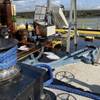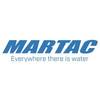GlobalSantaFe reported net income for the quarter ended June 30, 2002, of $73.4 million, or $0.31 per diluted share, on revenues of $501.7 million, versus $84.3 million and $0.69 per diluted share for the corresponding 2001 quarter. For the six months ended June 30, 2002, GlobalSantaFe reported net income of $150.5 million, or $0.63 per diluted share, on revenues of $990.4 million. This compares to net income of $125.0 million, or $1.03 per diluted share, for the six months ended June 30, 2001. Comparisons to the 2001 financial results may not be meaningful as they reflect only the performance of Global Marine prior to the November 2001 merger that formed GlobalSantaFe.
Operating income for GlobalSantaFe's contract drilling business of $97.9 million for the second quarter of 2002 was up slightly from the first quarter of 2002. During the second quarter, the company continued to make good progress on its merger integration. The company's operating expenses were in line with its expectations, and operating margins for its jackup drilling rigs worldwide were generally stable or improving. The U.S. Gulf of Mexico jackup market showed noteworthy improvement, with average dayrates for the company's Gulf of Mexico-based jackups at the end of the second quarter gaining about $4,100 from levels realized at the end of the earlier quarter. This improvement was offset, however, by a weaker market for floating rigs (semisubmersibles and drillships) worldwide. One of the company's North Sea- based semisubmersibles and its mid-water-depth drillship were idle for about half of the second quarter, while a Gulf of Mexico-based semisubmersible began a new contract at a significantly lower dayrate.
Impacting revenues in the 2002 second quarter, the company had seven of its jackups in shipyards at various times for planned upgrades. Four of the seven rigs have since returned to service, and the company expects at least two of the remaining three rigs to be working by the end of the third quarter of 2002. Excluding the rigs in the shipyard, GlobalSantaFe's worldwide jackup utilization in the second quarter was 99 percent.
Continued economic uncertainty in Venezuela has led most oil and gas customers there to discontinue their drilling operations. Consequently, GlobalSantaFe's eight land drilling rigs in this market were idle by the end of the second quarter. The company expects these rigs to be idle through at least the third quarter of 2002.
"We expect jackup dayrates in North and West Africa, the Middle East and Southeast Asia to remain generally strong for the balance of 2002," GlobalSantaFe's President and CEO Sted Garber said. "And, in the U.S. Gulf of Mexico, we anticipate growing demand for high-end jackups like ours will continue to push dayrates for these rigs higher. Combined, our equipment in these five key markets represents three-fourths of our entire worldwide jackup fleet.
"The floating rig market, on the other hand, will likely continue to be weak worldwide, and the market for North Sea-based jackups is expected to soften. Of the company's 13 floating rigs, 10 are currently contracted, with about 55 percent of the remaining available days for its floating rig fleet already committed through the end of 2002. The North Sea market has shown the greatest weakness following the imposition of a 10 percent incremental tax on operating profit generated from oil and gas production from certain North Sea fields. A number of operators there have reduced their drilling activities, causing rig utilization in the area to soften for both semisubmersibles and jackups."
In addition to the company's previously mentioned semisubmersible already idle in the North Sea, two more of its semisubmersibles in this market are nearing the end of their current contracts and do not have follow-on work. To mitigate its exposure to the weakening North Sea drilling market, the company has recently relocated the Glomar Grand Banks semisubmersible from the North Sea to eastern Canada, where it secured a contract at a dayrate substantially higher than it was earning in the North Sea. In addition, the company is optimistic that another one of its semisubmersibles in the North Sea will be awarded a contract in West Africa and is also seeking work there for one of its North Sea-based jackups.
During the quarter, the company began construction on a second previously committed high-specification jackup, due for delivery in the first quarter of 2004. The two other ongoing newbuild projects -- a high-specification jackup and a semisubmersible suited for deepwater development drilling -- remain on budget and are scheduled for delivery in the first and fourth quarters of 2003, respectively
Sponsored Content
Safer Starts Here: Build Ships, Protect Crews

Subscribe for
Maritime Reporter E-News
Maritime Reporter E-News is the maritime industry's largest circulation and most authoritative ENews Service, delivered to your Email five times per week









